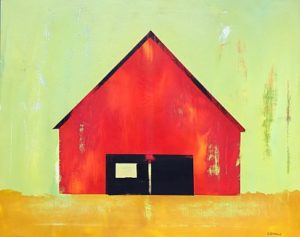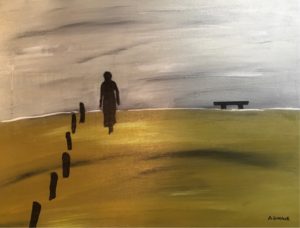Recently, the writer/artist Bill Batson wonderfully cajoled me into speaking before his great Learning Collaborative class of inquisitive adults, at the New City, N.Y., Jewish Center. He asked that my remarks be posted via my essay site. Thanks, Bill, for the invite.
The topic was “The Changing Role of the ‘Media’ in Social and Civic Discourse Today.”
Well — “media,” first we have to describe that word, that term. It’s one I have never used, for to lump all information sources under one umbrella blurs individual assets.
I toiled quite happily for 42 years at the now-defunct Rockland Journal-News out of Nyack, first as a copyboy, then as a photographer, at various editorships, then 20 years as editorial page editor and 25 as a columnist. I continue my column online. I was a newspaperman, I still am, period. Irreverent, rough hewn at times, distrusting of all “facts,” but as sentimental as my mother would want me to be. Never did I think of myself as “media,” nor do I recall that term being used to describe news services until perhaps the 1990s when ever-bigger corporations, many without newspaper portfolio, began to buy news outlets for profit only, involving themselves in newsrooms that publishers generally used to leave alone. And for good reason — it was so as not to disturb fact-gathering.
My friends at magazines were magazine journalists. In radio, then still a strong medium, they were broadcasters but journalists first. People like Ed Murrow and Walt Cronkite. Those types moved to TV where they were newscasters but remained journalists. They were not news readers nor pretty “talking heads.” None of those people back then would have said they were in the “media.”
They were in their professions to get the facts as they observed them, the journalists’ biblical requirement of “who, what, where, when, how and why.” There was bias then, of course, and newspapers, magazines, radio and TV all reflected that. Yet by reporting relentlessly, the education process continued, affecting social and civic discourse. There was light in darkness, and so progress in civic and social discourse.
When they did the job right, when I did it right, and maybe that was on average 60 percent without luck and 80 with, and despite blatant prejudices of the time, reflected in our work, we helped shape the national and local social and civic discourse of the time simply by reporting on everything we could, from international/national concerns like war, dictatorships, the economy, to local matters such as spot zoning, crooked politicians, wasted taxpayer money, school sports, community doings, so-called “good news.”
Editorialists and other commentators took the facts as reported and presented and offered opinion, which also shaped mores, social and civic discourse.
That was then, the better part of the last half century. Now, with threats to the
must-have search for truth that is the spotlight against democracy dying in darkness, we must all be worried. Not only about social/civic discourse but about deliberately planted misinformation, disinformation, prejudice and jingoism, citing media sources as “enemy of the people,” as two world leaders have done in the last 90 years. One was Hitler, the other Trump.
“Media” — back to that term — has become a lump-them-all-in-one term describing means of communication, yes, but
seemingly assuming that every information outlet cherishes the same purpose: to inform. Not so. Now special interests are at work, too. And, without going over to a “deep-state conspiracy,” there is an ever-increasing effort to limit information, controlling the flow through so-called public relations set-ups, through Internet restriction, through dropping press conferences at the present White House. They don’t want questions asked. Even the decline of newspapers is taking advantage of by special interests that do not want the people to know what is happening.
With the increasing loss of print journalism, especially local newspapers and invaluable college sheets, too, with social media such as Twitter offering twits a chance to espouse as well as those who seek to inform, with foreign powers like the Russians, and who knows, with perhaps even embedded nationalists in our government trying to shape opinion in what is becoming an oligarchy, with ever-larger public relations firms blocking access to top executives, school administrators and public officials, we must be concerned about the management of news and the effect on social and civic discourse. Big Brother, with siblings, is in the house.
What to do?
The role of news and information-gathering going forward is as it has always been, media label or not. They must inform as much as possible on as much as possible, with no bias, no opinion allowed into the reports. And there must be recognition that the media cannot be the parent. Civility in particular must come from our institutions — religious houses, schools and the home. And from the standards that communities must insist upon.
We in news-gathering/reporting, and that includes “citizen journalists” today who take to Facebook, Medium, Twitter and other social media, must be the “mirror” of what is happening in social/civic discourse.
And we must do this job relentlessly because even as we speak there are sinister people seeking to tear away the First Amendment draping on Lady Liberty. For our own good, you see.
We readers/viewers must police ourselves, being the buyer who knows to beware, who questions even to the point of the old newspaperman’s irreverence. That is vital given the deliberate planting of falsehoods and social media posts dredging up past comments by journalists and re-quoting out of context.
We must not let up on key issues, such as mass shootings, which fade in the seven-day news cycle. The sinister ones count on that.
They court distraction. We must be an example of civility and open discourse.
We must demand that social media such as Facebook vet their advertisers, to determine if there is dark money behind undue influence-buying. The postings must have disclaimers. We must press all information sources to cover key issues, not just those that are tabloid sexy or that grab attention for the moment.
(An example of this might be the recent lack of coverage over the mass burning of the invaluable Amazon rain forest versus the short-lived but intensive spotlight on the sad fire at Notre Dame.)
Find news sources you can trust and support them through paid circulation, paid digital, and urge taxpayer-funded national and local news-gathering that is operated in blind trust to avoid government influence. Every county should have such an information source. An ombudsman for unfettered information-gathering, you could say.
Poison spreads in gossip, deliberate or otherwise. Reject it. Know the sources.
Reject, too, insults, half-truths, showboating. This is not who we are.
This great American experiment was initially given nerve juice by such writings as Thomas Paine’s “Common Sense.” Over the centuries, newspapers have reported on the doings of the experiment, its failures, its hopes. Letters to the editor have added the voice of the people. Radio, TV, magazines have joined the march. Now there is social media.
But no matter what you use to obtain information, no matter what opinion you absorb, it is up to the individual to apply common sense to set social and civic discourse.
And do that every day. Demand information. Question. Express yourself. Be responsible. Show class.
Remember, the baddies are multiplying like cockroaches, led by a pied piper. Don’t be baited. We are all the “media” now, and we must guard the beliefs of the nation’s Founders, working toward a “more perfect union.” Seek the facts. Digest with care. Think for yourselves.
—30-




